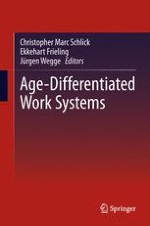2013 | OriginalPaper | Buchkapitel
Age-Differentiated Work Systems Enhance Productivity and Retention of Old Employees
verfasst von : Thomas Zwick, Christian Göbel, Jan Fries
Erschienen in: Age-Differentiated Work Systems
Verlag: Springer Berlin Heidelberg
Aktivieren Sie unsere intelligente Suche, um passende Fachinhalte oder Patente zu finden.
Wählen Sie Textabschnitte aus um mit Künstlicher Intelligenz passenden Patente zu finden. powered by
Markieren Sie Textabschnitte, um KI-gestützt weitere passende Inhalte zu finden. powered by
